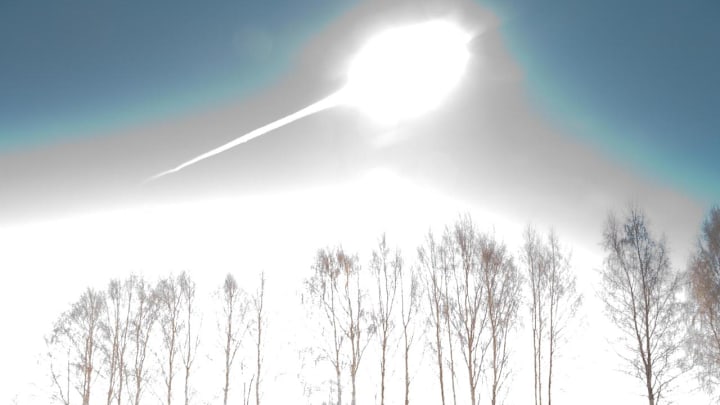By Peter Weber
Meteor showers happen all the time. Most are eagerly anticipated annual events, like the Perseid meteor shower in August, the Orionids in October, and the Geminids in December. The meteors often appear like shooting stars seconds before their mass burns up in our planet’s atmosphere. But in 2013, a massive meteorite didn’t just explode in the skies above Russia—it burst into fireballs and slammed into Earth. And it was caught on camera.
The city of Chelyabinsk, in the Ural Mountains about 930 miles east of Moscow, was pelted by at least one meteorite on February 15, 2013, freaking out residents as bright streaks blazed across the sky and loud explosions shook windows. The meteorite was estimated to be 20 meters (65.6 feet) wide and traveling at 42,690 mph when it exploded about 18 miles above the surface of the Earth, showering the area with molten rocks.
According to the Planetary Society, the blast emitted a shockwave equivalent to the energy from 500 kilotons (more than 550,000 tons) of dynamite. Residents close to the event were injured by flying broken glass after they had glimpsed a burst of light outside and gone to their windows to see what had happened. Motorists driving in the city captured the scene on their dashboard cameras.
More than 7000 buildings were damaged and 1500 people hurt by the force of the shockwave—though, if the meteorite had exploded any closer to Earth’s surface, the destruction would have been exponentially more catastrophic.
But that may not have been the scariest part of the event. What alarmed NASA and other space agencies was that no one had detected the asteroid as it hurtled toward Earth. Since the 2013 event, agencies have stepped up development of asteroid-detecting systems so that the next asteroid-turned-meteorite won’t catch officials off-guard again.
A version of this article was originally published in 2013 and has been updated for 2023.
